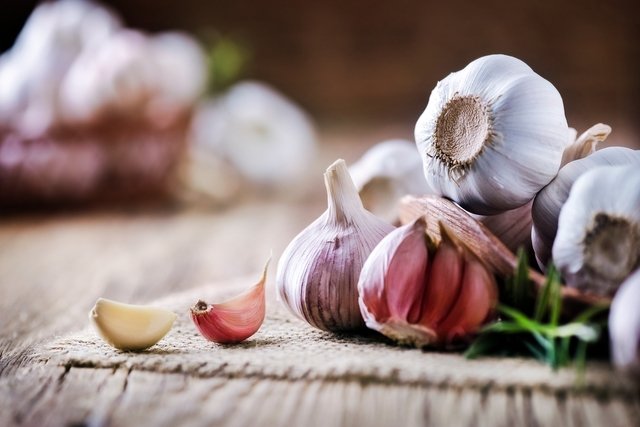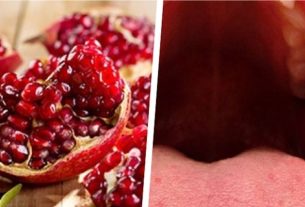An irritated throat can be soothed with simple measures and natural remedies, which can be easily found or prepared at home, such as honey, garlic, gargling with salt water and steam baths.
Throat irritation is usually caused by flu, colds, allergies or tonsillitis, but it can also arise from less common situations such as reflux. Therefore, if the feeling of an irritated throat persists for several days, worsens or is accompanied by other symptoms such as fever or tiredness, it is important to consult a general practitioner to identify the cause and begin appropriate treatment. Discover the main causes of throat irritation.
What to do
Some homemade options that help soothe a sore throat are:
1. Gargle warm salt water
Gargling warm water with salt helps soothe throat irritation, as well as helping to eliminate secretions.
To prepare the solution, simply add 1 tablespoon of salt to 1 glass of warm water and mix well until the salt is completely dissolved. Then, simply gargle for as long as possible, expelling the water, and then repeat the process 2 more times.
2. Nebulize with saline solution
Nebulizing with saline helps hydrate the airways, relieving dryness in the throat, which is one of the main causes of irritation, as well as being a great option to help alleviate allergies, such as rhinitis or sinusitis.
Nebulization can be done with a nebulizer device, but it can also be done with a humidifier or inhaling water vapor from the shower. Learn about the different forms of nebulization.
3. Take honey
Honey is a great home remedy for relieving irritation and sore throats, due to its antimicrobial, antioxidant, soothing and healing properties.
To enjoy the benefits of honey, simply take a spoonful of this pure food, or add it to tea. Discover other health benefits of honey.
4. Drink teas
Infusions of extracts from some plants, such as chamomile, sage, peppermint, arnica or echinacea, can help relieve throat irritation, due to their lubricating, anti-inflammatory, healing, astringent and immune system stimulating properties.
To prepare the teas, simply place 2 teaspoons of dried chamomile flowers or 1 teaspoon of echinacea root or leaves in 1 cup of boiling water and keep in a covered container for 10 to 15 minutes. Strain, let cool and drink 3 times a day. In addition, you can also gargle with warm tea. See other teas that can help soothe throat irritation.
5. Gargle apple cider vinegar and water
Apple cider vinegar has antimicrobial properties and, therefore, can help eliminate bacteria from the throat, combating irritation. Discover other health benefits of apple cider vinegar.
To gargle, simply mix 1 to 2 tablespoons of apple cider vinegar in a glass of water, gargle for as long as possible and then expel the water. Repeat the process 2 more times.
6. Suck honey and lemon or mint candy
Sucking candy or honey tablets with lemon or mint helps to increase the amount of saliva, hydrating and reducing throat irritation.
In addition to containing natural extracts with bactericidal properties, some lozenges may also contain medications, such as analgesics and antiseptics, which also help to relieve throat irritation.
7. Take a garlic supplement
Garlic contains allicin, a bioactive compound with antimicrobial and anti-inflammatory properties, making it a good option to help treat an irritated and inflamed throat.
To enjoy its benefits, simply consume a clove of fresh chopped or crushed garlic per day or take a garlic supplement in capsules daily. See how to take the garlic supplement.
Bibliography
- GOPAL, Judy et al. Authenticating apple cider vinegar’s home remedy claims: antibacterial, antifungal, antiviral properties and cytotoxicity aspect. Natural Product Research. Vol.33. 6.ed; 1-5, 2019
- SRIVASTAVA, Janmejai K. et. al.. Chamomile: A herbal medicine of the past with bright future. Mole With Report. . Vol.6. 3. oath; 895-901, 2010
- JOHNSTONE, Carol S. et. to the. . Vinegar: Medicinal Uses and Antiglycemic Effect. MedGenMed.. Vol.2. 2nd ed. 61, 2006
- MINISTRY OF HEALTH AND ANVISA. MONOGRAPH OF THE SPECIES Allium sativum (GARLIC). 2015. Available at: <https://portalarquivos2.saude.gov.br/images/pdf/2017/setembro/11/Monografia-Allium.pdf>. Accessed on June 9, 2020
- PAUL, Ian M.; BEILER, Jessica; MCMONAGLE, Amyee. Effect of Honey, Dextromethorphan, and No Treatment on Nocturnal Cough and Sleep Quality for Coughing Children and Their Parents. Arch Pediatr Adolesc Med. Vol, 161, n.12. 1140-1146, 2007
- MEO, Sultan A. et al. Role of honey in modern medicine. Saudi Journal of Biological Sciences. Vol.24, n.5. 975-978, 2017
- EXAMINE.COM. Garlic. Available at: <https://examine.com/supplements/garlic/research/#longevity>. Accessed on June 9, 2020
- JOURNAL OF IMMUNOLOGY RESEARCH. Immunomodulation and Anti-Inflammatory Effects of Garlic Compounds. 2015. Available at: <https://www.ncbi.nlm.nih.gov/pmc/articles/PMC4417560/>. Accessed on June 9, 2020

Sign up for our newsletter and stay up to date with exclusive news
that can transform your routine!
Warning: Undefined array key "title" in /home/storelat/public_html/wp-content/plugins/link-whisper-premium/templates/frontend/related-posts.php on line 12
Warning: Undefined array key "title_tag" in /home/storelat/public_html/wp-content/plugins/link-whisper-premium/templates/frontend/related-posts.php on line 13




